Unit 5 speaking[上学期]
文档属性
| 名称 | Unit 5 speaking[上学期] |

|
|
| 格式 | rar | ||
| 文件大小 | 2.0MB | ||
| 资源类型 | 教案 | ||
| 版本资源 | 人教版(新课程标准) | ||
| 科目 | 英语 | ||
| 更新时间 | 2006-07-16 00:00:00 | ||
图片预览


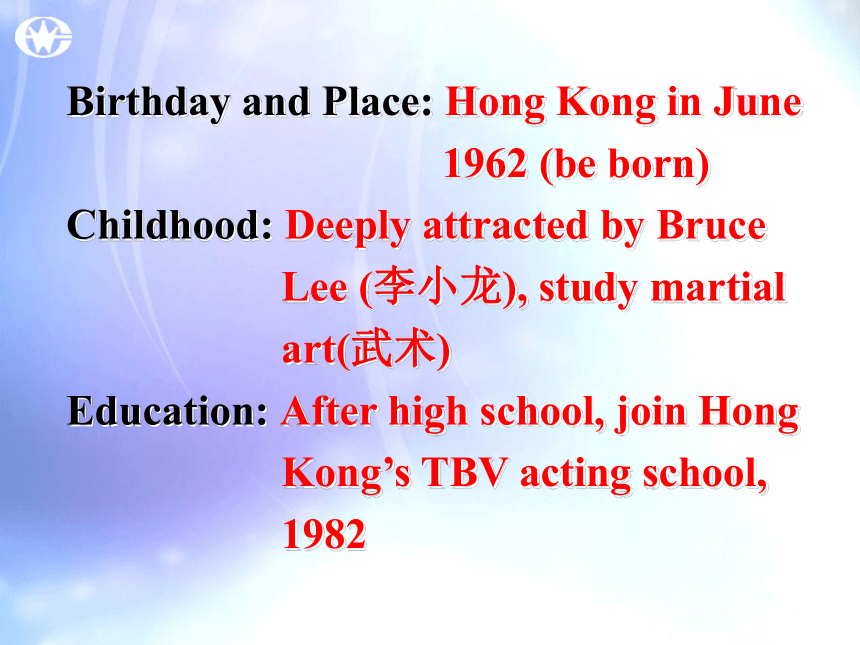
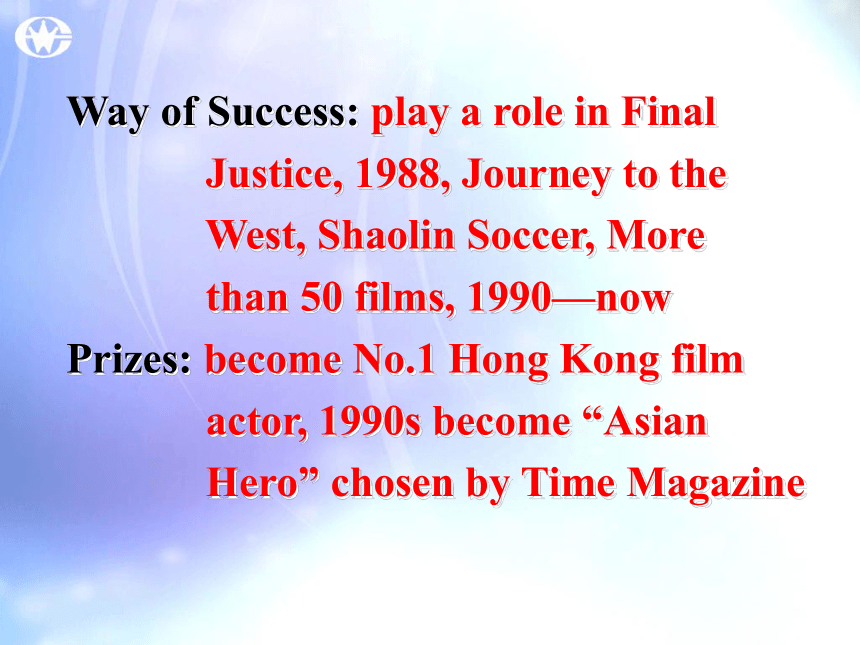

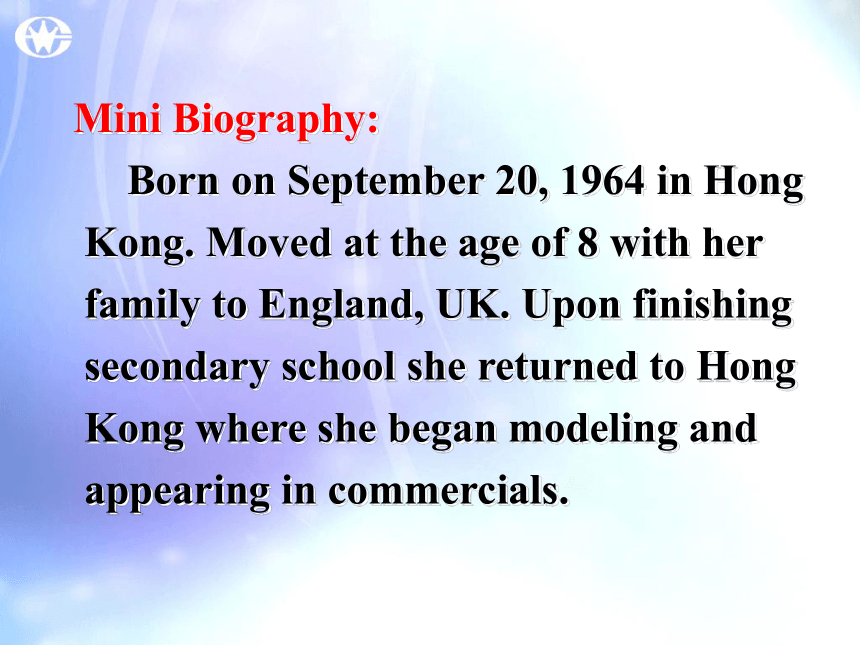
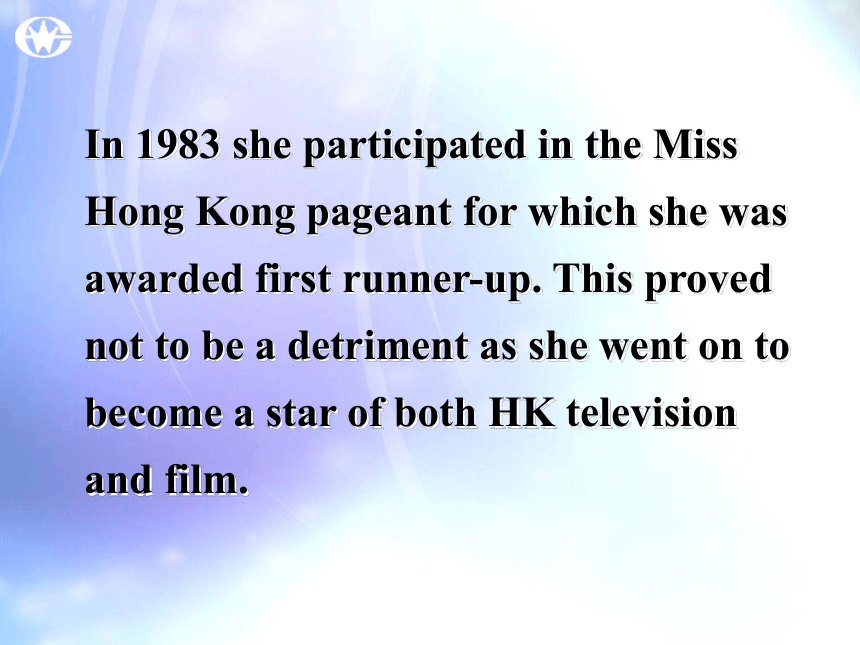

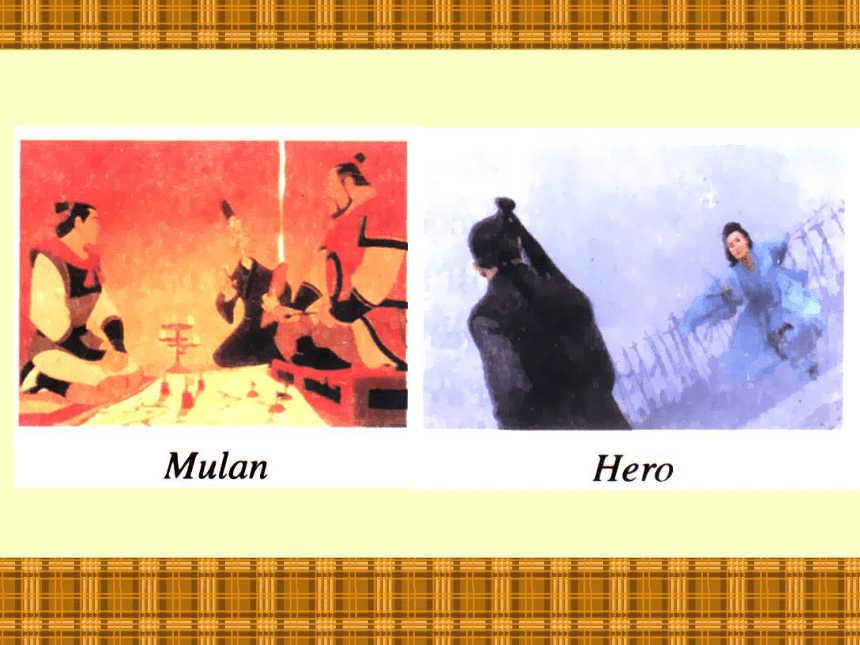
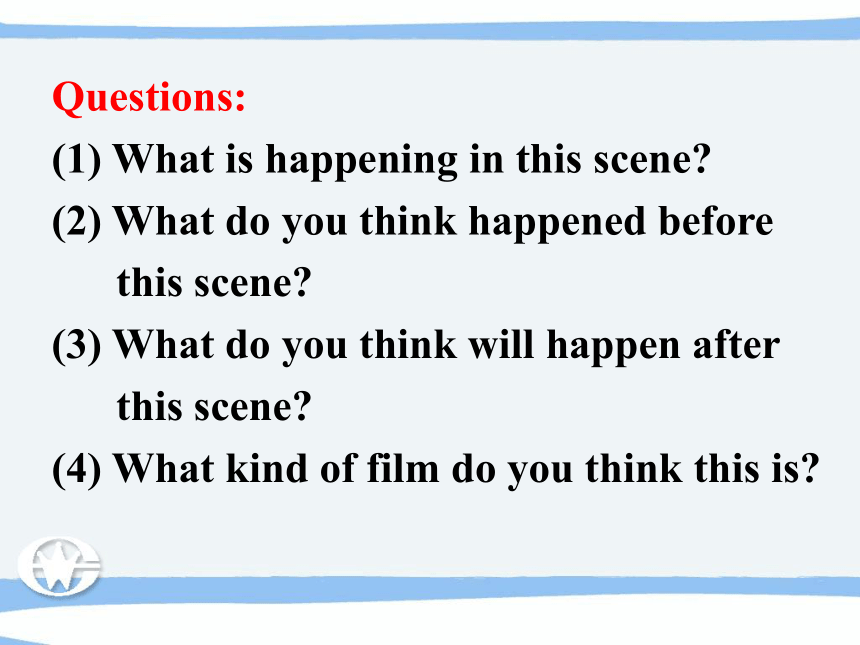
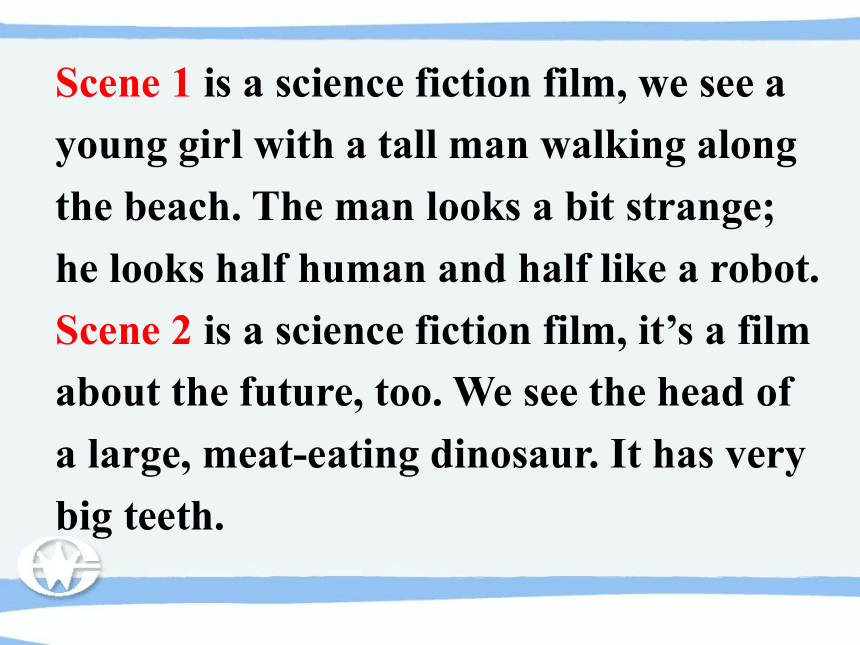
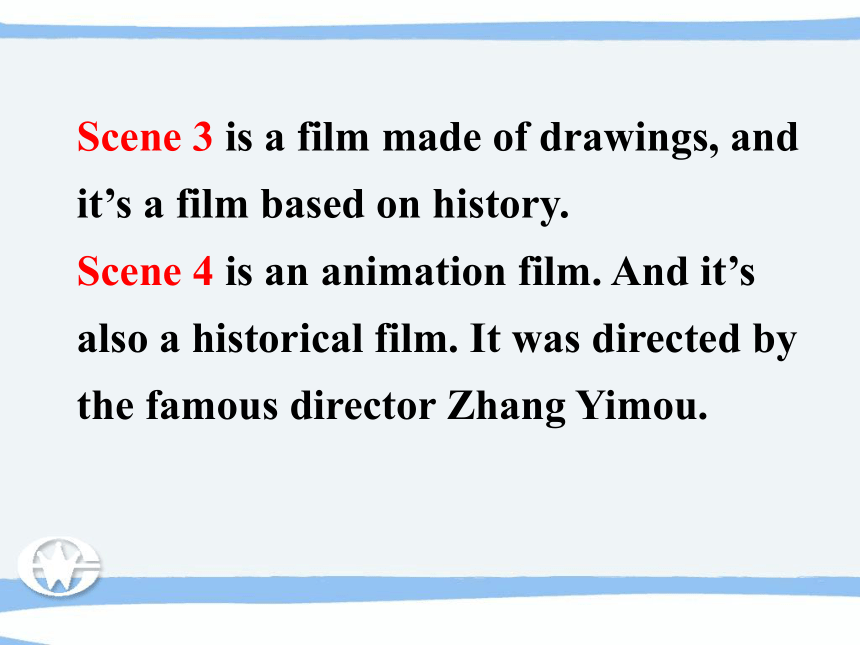
文档简介
课件56张PPT。Speaking 人教修订版
高中一年级(上)
Unit 5Warming up Stephen Chow(周星驰)Talk about your favorite actors or actresses.Birthday and Place: Hong Kong in June
1962 (be born)
Childhood: Deeply attracted by Bruce
Lee (李小龙), study martial
art(武术)
Education: After high school, join Hong
Kong’s TBV acting school,
1982 Way of Success: play a role in Final
Justice, 1988, Journey to the
West, Shaolin Soccer, More
than 50 films, 1990—now
Prizes: become No.1 Hong Kong film
actor, 1990s become “Asian
Hero” chosen by Time MagazineMaggie Cheung (张曼玉) Mini Biography:
Born on September 20, 1964 in Hong Kong. Moved at the age of 8 with her family to England, UK. Upon finishing secondary school she returned to Hong Kong where she began modeling and appearing in commercials. In 1983 she participated in the Miss Hong Kong pageant for which she was awarded first runner-up. This proved not to be a detriment as she went on to become a star of both HK television and film.Look at the pictures on page 29 Questions:
(1) What is happening in this scene?
(2) What do you think happened before
this scene?
(3) What do you think will happen after
this scene?
(4) What kind of film do you think this is? Scene 1 is a science fiction film, we see a young girl with a tall man walking along the beach. The man looks a bit strange; he looks half human and half like a robot.
Scene 2 is a science fiction film, it’s a film about the future, too. We see the head of a large, meat-eating dinosaur. It has very big teeth. Scene 3 is a film made of drawings, and it’s a film based on history.
Scene 4 is an animation film. And it’s also a historical film. It was directed by the famous director Zhang Yimou. Explanation 1. After graduating, she went to New
York, where she started working as an
actress and won the Theater World
Award for her role in a play.
毕业后,她到纽约去了,在那里开始
当一名演员,因为她在戏中扮演一个角
色而获世界戏剧奖。(1)句中where she started working as an
actress and won the… in a play作定
语, 补充说明New York。
e. g.
Before long he moved to America,
where he lived for ten years.
不久他搬到美国,在那里他呆了十年。(2)as用介词,意思是“作为, 当作”。
e. g.
He worked as a teacher.
他当了一名教师。
(3)win
①用作不及物动词, 意思是“ 胜, 获胜,
得胜, 成功, 达到” 。意思与succeed同义,
与fail相反。e. g.
In the competition,we have won.
在比赛中, 我们胜利了。
②用作及物动词, 意思是“获得,博得”。
e. g.
He won the Nobel prize for physics.
他获得诺贝尔物理学奖。 [注意]我们赢了他们。不能说We won them. 而应说We beat them. 因为win的宾语不是竞争对手, 而是比赛, 战斗, 奖品等。
2. During the 1980s and 1990s she won many more prizes while playing in famous films such as Sophie’s choice… 在二十世纪八十年代和九十年代, 她在像《索菲的选择》等这样有名的电影中扮演角色而获更多的奖。
(1) the l980s and l990s二十世纪八十年代和九十年代。年代表达法通常在基数词后加s, 例如十九世纪七十年代, the l870s, 读作the nineteen seventies, 也可表达为the l870’s, 定冠词通常不能省略。e. g.
In the 1990s, he often went abroad.
在二十世纪九十年代, 他常常出国。
(2) while+动词-ing形式表示“在做什么的
时候”。
e. g.
How do you feel while standing on
your head.
倒立时, 你的感觉如何呢?(3) such as… 表示“诸如……之类”,
通常用来列举。
e. g.
Many of the programmes are well
received,such as Follow Me.
许多节目,如《跟我学》,收视率很
好的。
[辨析]such as,such...as①such as通常用来列举事例。
e. g.
Things such as chairs, curtains,
cooking pots,drinking cups,bird
cages can all be made of bamboo.
类似椅子,窗帘,饭罐,水杯,鸟笼
等东西都可以用竹制造。②such… as… 表示“像……这样的……
诸如……之类”一般可换成such as. . .
或 like的介词短语。
e. g.
Such languages as Chinese,Russian,
Japanese and German are difficult to
learn well.=Languages such as Chinese,Russian,Japanese and German are difficult to learn well.
=Languages like Chinese,Russian,Japanese and German are difficult to learn well.
像中文,俄文,日文,德文等语言很难学好。Speaking Sentence structures:
You studied /worked/ acted at different...
What did you do next?
What made you decide to...?
What roles did you act?
(Interviewing Meryl Streep.) (R: Reporter M: Meryl Streep)
R: Welcome to join our wonderful
programme. Today in our programme,
our guest is the famous actress Meryl
Streep. How are you, Mrs. Streep?
M: Fine, thank you.
R: Mrs. Streep, would you mind me
asking some questions about your life?M: Of course not.
R: Okey, so could you tell us something
about the place where you grew up?
M: Actually, I was born in a really small
village in America in 1949.
R: I know that you studied at different
art schools. Could you please tell us
something about the time when you were young? Did you have any dreams
about the future? And what made you
decide to become an actress?
M: I think I’ve always wanted to become
an actress since I was a little girl.
That’s why first I went to drama
school after graduating from high
school. And then, as a student I enjoyed acting in theatre plays.
R: What did you do after that? Were
there any special reasons why you
started working in film?
M: I enjoy being an actress. Film is very
interesting, because you can reach so
many people around the world. I also
still enjoy acting in the theatre, though most of my work is for the
film. Anyway, I like this job.
R: I see. Can you tell us a little bit more
about your career as a film star?
What roles did you act?
M: My first film was called Julia, back in
1997. Some of my favorite films were
Sophie’s Choice, later on Out of Africa, and more recently, the film
called The Music of the Heart.
R: Mrs Streep, thank you for this
interesting talk. We hope that you
can act more films.
M: I hope so, and I’ll try my best.
Thank you. (Interviewing Keanu Reeves.)
(R: the reporter K: Keanu Reeves)
R: We will be talking to Mr. Keanu
Reeves in today’s show. Welcome to
our talk show, Mr. Reeves.
K: It’s my pleasure.R: Mr. Reeves, I think many people are
interested in knowing the place where
you grew up? Could you tell us
something about that.
K: Sure. First, let me say that I’ve been
very lucky with my parents. When I
was born, we lived in Lebanon, where
I spent my early years, after that
moved to Toronto, a big city in
Canada, where I grew up and went
to high school.
R: How about your childhood? Please
tell us something more about the time
when you were young.
K: Toronto is a big city. I didn’t like to
go to school, so I left high school without a degree when I was 17. I
started doing all kinds of small jobs
to make money.
R: What made you decide to become an
actor? And how did you get success?
K: I went from one small job to another.
Finally, after about two years, I was
asked to act in a film called Woof- Boy.
R: I know. So what made you stay in the
film world?
K: That’s because of my stepfather. He
is a film director. I had very much
enjoyed acting in WolfBoy, and two
years later I moved to Hollywood,
where my stepfather lived. I hoped he could help me start a career in film.
R: Can you tell us a bit more about your
career? What kind of roles did you act?
K: Well, I think it wasn’t easy. I acted in
many cheap films for a few years, until
I was asked for a film called Speed.
That was in 1994. The film was a big
success and since then I have acted in more than 12 films, such as The
Matrix and Hardball.
R: Mr. Reeves, thank you for this
interview, and good luck with your
career.
K: That’s my pleasure. Thanks. Talking on page 109TV talk show
Role A: an actor—A
Role B: a fan—F
Role C: a shopkeeper—S
Role D: a policeman—P
Role E: the host—HH: Good evening ladies and gentlemen,
welcome to our talk show tonight.
This time we are going to talk about
copyrights in China. As we all know,
for many years many people are used
to buying cheap CDs, VCDs and
DVDs. Especially since China joined
the WTO, there has been growing concern to protect the rights of artists. Cheap DVDs often cost only six to twelve yuan, but the official price in the shops is around 65 to 70 yuan. Many people are worried that if prices are getting higher in the shops, some people will no longer be able to afford buying CDs and VCDs. F, what’s your opinion in this matter?
F: Well, I’m a film fan and I really try to
keep up with all the films that come
out. It usually takes some time before
new films are shown on TV and
cinema tickets are also getting more
and more expensive. I think that
DVDs should be much cheaper, because many people, like me, don’t
have so much money to buy them
when they are 70 yuan each.
A: I’m afraid, I don’t agree with you.
Artists have to make a living, and our
income comes from selling DVDs.
DVDs should be sold at high prices to
give some money to those who have worked hard to make the DVDs. People forget that it costs money to make the discs, the boxes, the covers and so on. Besides, not only the artist, but also the studio, the producer and the musicians must be paid. If you think about all that, then in fact, DVDs are not very expensive.F: Well, that’s not true of course. 70 yuan
is a lot of money. I have heard from my
key pals that DVDs in the West cost
about the same price. But of course it
is much cheaper to make them in
China, so that means a lot of money
disappears into somebody’s packet.
A: You may be right. But I can tell you that that’s not the artist’s pocket. A lot
of money goes to the shopkeeper’s.
H: S, you are a shopkeeper. What do you
think about this?
S: Well, I disagree with A. Of course,
shopkeepers need to make some
money on the sales of discs. We have
to make a living as well. A should be happy that we sell his/her work, because without our shops everywhere in China, people would not buy their discs at all. But of course I agree with F. DVDs should not be too expensive for people. I sell cheap DVDs because I know that many people would not buy them if they were much more expensive and also because it is good for my shop. If nobody can afford expensive discs, and nobody buys, I have to close my shop and I lose my job. I don’t think DVDs should be sold at higher prices because people will stop buying and perhaps start to make their own copies on their computers.H: OK, next let’s listen to P’s opinion?
P: Well, I’m a policeman, and of course
what I personally think is not so
important. We have made laws in our
country and there are rules and
agreements that we must all follow in
the world. Selling cheap DVDs should be stopped because it is against the
law and it’s like stealing money from
the artists.
A: Exactly!
P: Besides, making and selling illegal
copies of CD/DVDs of foreign artists,
many foreigners think in a bad way about China, so it’s important that we
live by the law and international rules
and agreements such as the WTO. On
the other hand, the police don’t have
enough time to check out all the shops
in every part of China.
F: Well, of course I know that both
foreign and Chinese artists should make their money, but the point is that DVDs are much too expensive. Perhaps discs should be more than ten yuan, but 70 yuan is really much too expen-sive. I don’t believe it is so expensive to make the discs. Many books that are published in China are also much cheaper than abroad.S: I agree with F. I don’t think DVDs
should be sold at higher prices
because there are many people in
China. It’s better to sell 500 discs for
20 yuan than to sell 100 for 70, isn’t it?
Everybody can make much more
money.H: Very well. I think we’ll have to round
off the discussion. As P has explained,
both Chinese law and international
rules for copyrights and the WTO say
that only legal copies can be sold. F
and S agree that DVDs should not be
sold at higher prices. They also think that more discs can be sold if the price of discs is lower because there are many people in China, and it is better to sell 500 discs for 20 yuan than to sell 100 for 70. Perhaps a price of around 25 yuan would be possible. When the prices are lower, there won’t be as many illegal copies and that is better for the society and also for economy. In fact, lower prices are good for everybody. I want to thank everybody for their contri-bution to this interesting discussion. Thank you, that’s all for today.Homework1. Practise talking on page 109 after class, and each group should write a conclusion about your opinion of copyright.
2. Preview: Search some information on the internet about Malcolm Langland.
高中一年级(上)
Unit 5Warming up Stephen Chow(周星驰)Talk about your favorite actors or actresses.Birthday and Place: Hong Kong in June
1962 (be born)
Childhood: Deeply attracted by Bruce
Lee (李小龙), study martial
art(武术)
Education: After high school, join Hong
Kong’s TBV acting school,
1982 Way of Success: play a role in Final
Justice, 1988, Journey to the
West, Shaolin Soccer, More
than 50 films, 1990—now
Prizes: become No.1 Hong Kong film
actor, 1990s become “Asian
Hero” chosen by Time MagazineMaggie Cheung (张曼玉) Mini Biography:
Born on September 20, 1964 in Hong Kong. Moved at the age of 8 with her family to England, UK. Upon finishing secondary school she returned to Hong Kong where she began modeling and appearing in commercials. In 1983 she participated in the Miss Hong Kong pageant for which she was awarded first runner-up. This proved not to be a detriment as she went on to become a star of both HK television and film.Look at the pictures on page 29 Questions:
(1) What is happening in this scene?
(2) What do you think happened before
this scene?
(3) What do you think will happen after
this scene?
(4) What kind of film do you think this is? Scene 1 is a science fiction film, we see a young girl with a tall man walking along the beach. The man looks a bit strange; he looks half human and half like a robot.
Scene 2 is a science fiction film, it’s a film about the future, too. We see the head of a large, meat-eating dinosaur. It has very big teeth. Scene 3 is a film made of drawings, and it’s a film based on history.
Scene 4 is an animation film. And it’s also a historical film. It was directed by the famous director Zhang Yimou. Explanation 1. After graduating, she went to New
York, where she started working as an
actress and won the Theater World
Award for her role in a play.
毕业后,她到纽约去了,在那里开始
当一名演员,因为她在戏中扮演一个角
色而获世界戏剧奖。(1)句中where she started working as an
actress and won the… in a play作定
语, 补充说明New York。
e. g.
Before long he moved to America,
where he lived for ten years.
不久他搬到美国,在那里他呆了十年。(2)as用介词,意思是“作为, 当作”。
e. g.
He worked as a teacher.
他当了一名教师。
(3)win
①用作不及物动词, 意思是“ 胜, 获胜,
得胜, 成功, 达到” 。意思与succeed同义,
与fail相反。e. g.
In the competition,we have won.
在比赛中, 我们胜利了。
②用作及物动词, 意思是“获得,博得”。
e. g.
He won the Nobel prize for physics.
他获得诺贝尔物理学奖。 [注意]我们赢了他们。不能说We won them. 而应说We beat them. 因为win的宾语不是竞争对手, 而是比赛, 战斗, 奖品等。
2. During the 1980s and 1990s she won many more prizes while playing in famous films such as Sophie’s choice… 在二十世纪八十年代和九十年代, 她在像《索菲的选择》等这样有名的电影中扮演角色而获更多的奖。
(1) the l980s and l990s二十世纪八十年代和九十年代。年代表达法通常在基数词后加s, 例如十九世纪七十年代, the l870s, 读作the nineteen seventies, 也可表达为the l870’s, 定冠词通常不能省略。e. g.
In the 1990s, he often went abroad.
在二十世纪九十年代, 他常常出国。
(2) while+动词-ing形式表示“在做什么的
时候”。
e. g.
How do you feel while standing on
your head.
倒立时, 你的感觉如何呢?(3) such as… 表示“诸如……之类”,
通常用来列举。
e. g.
Many of the programmes are well
received,such as Follow Me.
许多节目,如《跟我学》,收视率很
好的。
[辨析]such as,such...as①such as通常用来列举事例。
e. g.
Things such as chairs, curtains,
cooking pots,drinking cups,bird
cages can all be made of bamboo.
类似椅子,窗帘,饭罐,水杯,鸟笼
等东西都可以用竹制造。②such… as… 表示“像……这样的……
诸如……之类”一般可换成such as. . .
或 like的介词短语。
e. g.
Such languages as Chinese,Russian,
Japanese and German are difficult to
learn well.=Languages such as Chinese,Russian,Japanese and German are difficult to learn well.
=Languages like Chinese,Russian,Japanese and German are difficult to learn well.
像中文,俄文,日文,德文等语言很难学好。Speaking Sentence structures:
You studied /worked/ acted at different...
What did you do next?
What made you decide to...?
What roles did you act?
(Interviewing Meryl Streep.) (R: Reporter M: Meryl Streep)
R: Welcome to join our wonderful
programme. Today in our programme,
our guest is the famous actress Meryl
Streep. How are you, Mrs. Streep?
M: Fine, thank you.
R: Mrs. Streep, would you mind me
asking some questions about your life?M: Of course not.
R: Okey, so could you tell us something
about the place where you grew up?
M: Actually, I was born in a really small
village in America in 1949.
R: I know that you studied at different
art schools. Could you please tell us
something about the time when you were young? Did you have any dreams
about the future? And what made you
decide to become an actress?
M: I think I’ve always wanted to become
an actress since I was a little girl.
That’s why first I went to drama
school after graduating from high
school. And then, as a student I enjoyed acting in theatre plays.
R: What did you do after that? Were
there any special reasons why you
started working in film?
M: I enjoy being an actress. Film is very
interesting, because you can reach so
many people around the world. I also
still enjoy acting in the theatre, though most of my work is for the
film. Anyway, I like this job.
R: I see. Can you tell us a little bit more
about your career as a film star?
What roles did you act?
M: My first film was called Julia, back in
1997. Some of my favorite films were
Sophie’s Choice, later on Out of Africa, and more recently, the film
called The Music of the Heart.
R: Mrs Streep, thank you for this
interesting talk. We hope that you
can act more films.
M: I hope so, and I’ll try my best.
Thank you. (Interviewing Keanu Reeves.)
(R: the reporter K: Keanu Reeves)
R: We will be talking to Mr. Keanu
Reeves in today’s show. Welcome to
our talk show, Mr. Reeves.
K: It’s my pleasure.R: Mr. Reeves, I think many people are
interested in knowing the place where
you grew up? Could you tell us
something about that.
K: Sure. First, let me say that I’ve been
very lucky with my parents. When I
was born, we lived in Lebanon, where
I spent my early years, after that
moved to Toronto, a big city in
Canada, where I grew up and went
to high school.
R: How about your childhood? Please
tell us something more about the time
when you were young.
K: Toronto is a big city. I didn’t like to
go to school, so I left high school without a degree when I was 17. I
started doing all kinds of small jobs
to make money.
R: What made you decide to become an
actor? And how did you get success?
K: I went from one small job to another.
Finally, after about two years, I was
asked to act in a film called Woof- Boy.
R: I know. So what made you stay in the
film world?
K: That’s because of my stepfather. He
is a film director. I had very much
enjoyed acting in WolfBoy, and two
years later I moved to Hollywood,
where my stepfather lived. I hoped he could help me start a career in film.
R: Can you tell us a bit more about your
career? What kind of roles did you act?
K: Well, I think it wasn’t easy. I acted in
many cheap films for a few years, until
I was asked for a film called Speed.
That was in 1994. The film was a big
success and since then I have acted in more than 12 films, such as The
Matrix and Hardball.
R: Mr. Reeves, thank you for this
interview, and good luck with your
career.
K: That’s my pleasure. Thanks. Talking on page 109TV talk show
Role A: an actor—A
Role B: a fan—F
Role C: a shopkeeper—S
Role D: a policeman—P
Role E: the host—HH: Good evening ladies and gentlemen,
welcome to our talk show tonight.
This time we are going to talk about
copyrights in China. As we all know,
for many years many people are used
to buying cheap CDs, VCDs and
DVDs. Especially since China joined
the WTO, there has been growing concern to protect the rights of artists. Cheap DVDs often cost only six to twelve yuan, but the official price in the shops is around 65 to 70 yuan. Many people are worried that if prices are getting higher in the shops, some people will no longer be able to afford buying CDs and VCDs. F, what’s your opinion in this matter?
F: Well, I’m a film fan and I really try to
keep up with all the films that come
out. It usually takes some time before
new films are shown on TV and
cinema tickets are also getting more
and more expensive. I think that
DVDs should be much cheaper, because many people, like me, don’t
have so much money to buy them
when they are 70 yuan each.
A: I’m afraid, I don’t agree with you.
Artists have to make a living, and our
income comes from selling DVDs.
DVDs should be sold at high prices to
give some money to those who have worked hard to make the DVDs. People forget that it costs money to make the discs, the boxes, the covers and so on. Besides, not only the artist, but also the studio, the producer and the musicians must be paid. If you think about all that, then in fact, DVDs are not very expensive.F: Well, that’s not true of course. 70 yuan
is a lot of money. I have heard from my
key pals that DVDs in the West cost
about the same price. But of course it
is much cheaper to make them in
China, so that means a lot of money
disappears into somebody’s packet.
A: You may be right. But I can tell you that that’s not the artist’s pocket. A lot
of money goes to the shopkeeper’s.
H: S, you are a shopkeeper. What do you
think about this?
S: Well, I disagree with A. Of course,
shopkeepers need to make some
money on the sales of discs. We have
to make a living as well. A should be happy that we sell his/her work, because without our shops everywhere in China, people would not buy their discs at all. But of course I agree with F. DVDs should not be too expensive for people. I sell cheap DVDs because I know that many people would not buy them if they were much more expensive and also because it is good for my shop. If nobody can afford expensive discs, and nobody buys, I have to close my shop and I lose my job. I don’t think DVDs should be sold at higher prices because people will stop buying and perhaps start to make their own copies on their computers.H: OK, next let’s listen to P’s opinion?
P: Well, I’m a policeman, and of course
what I personally think is not so
important. We have made laws in our
country and there are rules and
agreements that we must all follow in
the world. Selling cheap DVDs should be stopped because it is against the
law and it’s like stealing money from
the artists.
A: Exactly!
P: Besides, making and selling illegal
copies of CD/DVDs of foreign artists,
many foreigners think in a bad way about China, so it’s important that we
live by the law and international rules
and agreements such as the WTO. On
the other hand, the police don’t have
enough time to check out all the shops
in every part of China.
F: Well, of course I know that both
foreign and Chinese artists should make their money, but the point is that DVDs are much too expensive. Perhaps discs should be more than ten yuan, but 70 yuan is really much too expen-sive. I don’t believe it is so expensive to make the discs. Many books that are published in China are also much cheaper than abroad.S: I agree with F. I don’t think DVDs
should be sold at higher prices
because there are many people in
China. It’s better to sell 500 discs for
20 yuan than to sell 100 for 70, isn’t it?
Everybody can make much more
money.H: Very well. I think we’ll have to round
off the discussion. As P has explained,
both Chinese law and international
rules for copyrights and the WTO say
that only legal copies can be sold. F
and S agree that DVDs should not be
sold at higher prices. They also think that more discs can be sold if the price of discs is lower because there are many people in China, and it is better to sell 500 discs for 20 yuan than to sell 100 for 70. Perhaps a price of around 25 yuan would be possible. When the prices are lower, there won’t be as many illegal copies and that is better for the society and also for economy. In fact, lower prices are good for everybody. I want to thank everybody for their contri-bution to this interesting discussion. Thank you, that’s all for today.Homework1. Practise talking on page 109 after class, and each group should write a conclusion about your opinion of copyright.
2. Preview: Search some information on the internet about Malcolm Langland.
